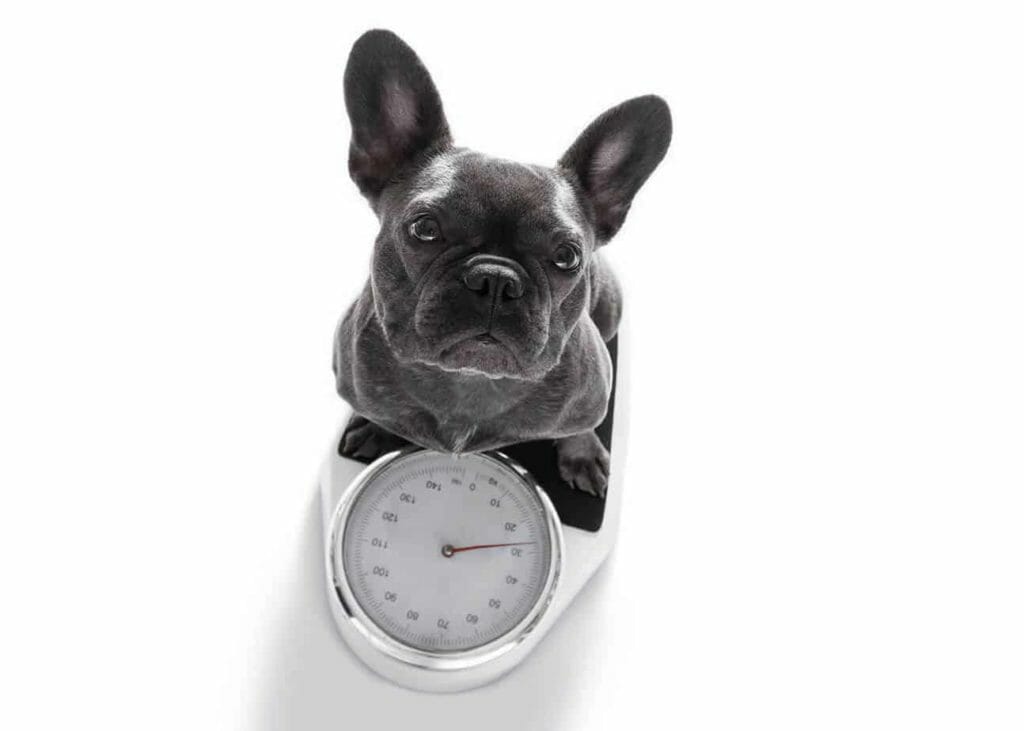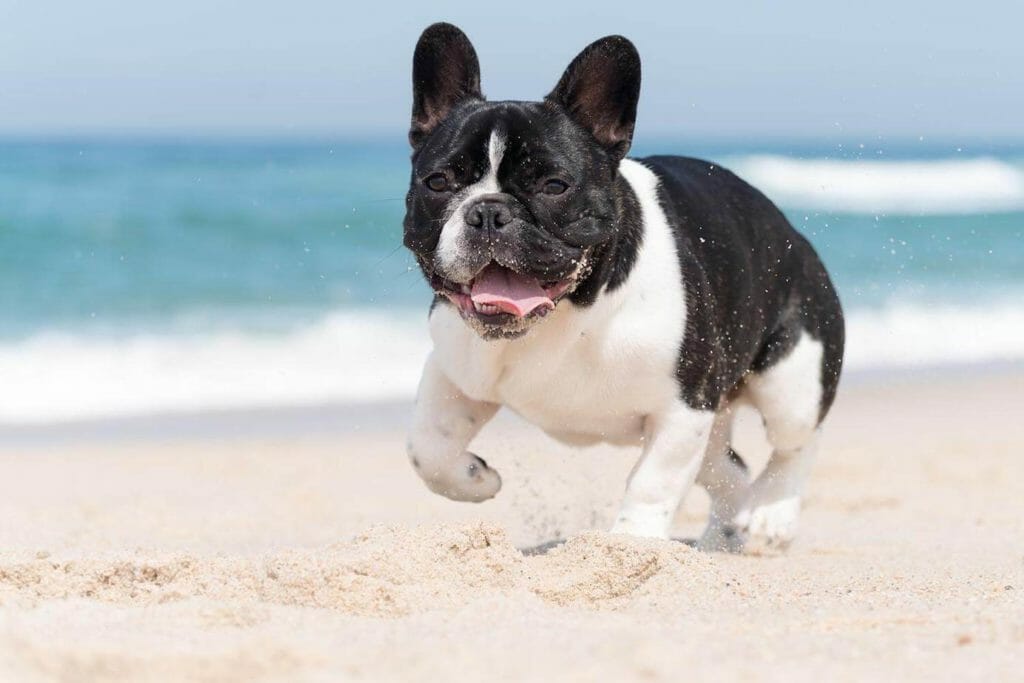
French bulldogs happen to be on the list of “compact or small dogs”. If you are wondering what is the average weight of a French Bulldog and how compact and if yours is within that average, I’m about to give you the answer and discuss all matters relating to the weight of French bulldogs, from puppy to adult.
How much do French Bulldogs weigh?
Adult French Bulldogs weigh between 18 and 28 pounds (8 and 13 kilograms). As such, French bulldogs’ average weight is 22 pounds (10 kilograms).
Notably, their sizes depend on the sex, with male Frenchies being slightly heavier than female Frenchies.
- Male Frenchies: 20 and 28 pounds (9 and 13 kilograms).
- Female Frenchies: 18 and 26 pounds (8 and 12 kilograms).
It’s vital for you as an owner to ensure that your French bulldog’s body weight remains within this threshold. This is based on the fact overweight Frenchies are susceptible to developing several health problems as we’ll detail later on.
Of importance is the fact that overweight Frenchies have a shorter life span than their healthy counterparts. Typically, the life expectancy of a healthy Frenchie is 10 to 14 years, although the figure varies from one region to another.
An overweight Frenchie’s lifespan is shorter than the healthy ones by two years. As such, you should take care of your Frenchie for them to live a long healthy life.
Male French Bulldog ideal weight chart
The average weight of a newborn male Frenchie is between 8 and 10 ounces (227 to 283 grams). In the first 24 hours, the puppies lose some body weight. The weight loss doesn’t exceed 10% of the original weight at birth.
The reason advanced to explain this phenomenon has a physiological basis whereby the puppies expel urine and meconium but don’t restore these expelled fluids faster enough.
Nonetheless, by day 3, they’ll have already surpassed their weight at birth, thereby signaling growth. As such, you shouldn’t be alarmed by the initial fluctuation.
At one week, the puppies weigh between 14 and 17 ounces (397 and 481 grams) while at two weeks, they weigh between 1.4 and 1.75 pounds (635 and 789 grams)
One-month-old male french bulldog puppies weigh about 3 pounds (1.4 kilograms), while at three months, they usually weigh between 8.5 and 12.8 pounds (3.9 and 5.8 kilograms).
At six months, they weigh between 15.4 and 23.6 pounds (7 and 10.7 kilograms). One-year-old Frenchies weigh between 19.8 and 28 pounds (9 and 13 kilograms).
| Age | Weight in pounds | Weight in kilograms |
|---|---|---|
| At birth | 0.5 – 0.625 (8 – 10 ounces) | 0.227 – 0.283 |
| 1 week | 0.875 – 1.06 (14 – 17 ounces) | 0.397 – 0.481 |
| 2 weeks | 1.4 – 1.75 | 0.635 – 0.789 |
| 4 weeks | 3 | 1.4 |
| 6 weeks | 4.2 – 4.9 | 1.9 – 2.2 |
| 8 weeks | 6.6 – 7.4 | 3 – 3.4 |
| 3 months | 8.5 – 12.8 | 3.9 – 5.8 |
| 6 months | 15.4 – 23.6 | 7 – 10.7 |
| 12 months | 19.8 – 28 | 9 – 13 |
Unlimited claims, No credit checks, No upper age limit & Multiple pet discounts
Compare the best rates on pet insurance
Female French Bulldog ideal weight chart
Female Frenchies weigh between 7 and 9 ounces (198 to 255 grams) at birth and also lose weight in the first 24 hours.
At one week, the puppies weigh between 13 and 16 ounces (369 and 454 grams), while at two weeks, they weigh between 1.1 and 1.6 pounds (499 and 726 grams).
At one month, they weigh around 2 pounds (0.9 kilograms). Three-months-old female Frenchies weigh between 7.7 and 12.1 pounds (3.5 and 5.5 kilograms).
While, at six months, they weigh between 13.8 and 22 pounds (6.3 and 10 kilograms), and one-year-old female French bulldogs weigh between 17.6 and 28 pounds (8 and 12.9 kilograms).
| Age | Weight in pounds | Weight in kilograms |
|---|---|---|
| At birth | 0.44 – 0.56 (7 – 9 ounces) | 0.198 – 0.255 |
| 1 week | 0.81 – 1 (13 – 16 ounces) | 0.369 – 0.454 |
| 2 weeks | 1.1 – 1.6 | 0.499 – 0.726 |
| 4 weeks | 2 | 0.9 |
| 6 weeks | 3.1 – 3.9 | 1.4 – 1.8 |
| 8 weeks | 6 | 2.7 |
| 3 months | 7.7 – 12.1 | 3.5 – 5.5 |
| 6 months | 13.8 – 22 | 6.3 – 10 |
| 12 months | 17.6 – 28 | 8 – 12.9 |
Frenchie Weight Facts
Frenchies attain their maximum sizes at varying times. Small-sized dogs, achieve their maximum weight at 12 months, while bigger-sized dogs will reach their maximum body size at 14 months.
Reasons for different Frenchie sizes
Evidently, male Frenchies are heavier than female ones. Other than that, it’s important to note that the litter size also impacts the weight of the newborn puppies up until they are about 1 month old. As such, puppies born in a litter of two will be larger than those born in a litter of five. Additional factors include the mother’s size, age, and weight.
Nevertheless, if your French Bulldog weight doesn’t fall within the ranges detailed above when it’s over one year old, then it’s either overweight or underweight.
Signs that a French Bulldog is overweight
The first and foremost sign is that your dog’s weight will be beyond the ranges given above. In the absence of a weighing scale, the following signs stand out.
1. You can’t feel your dog’s ribs.
In a healthy Frenchie, you should feel the ribs but not see them. For an overweight Frenchie, however, fat covers the ribs, making you unable to feel them.
2. Doesn’t have an hourglass shape
Their shape, when viewed from above, doesn’t mimic an hourglass with the loin region being narrow. Instead, your Frenchie has an oval shape since the loin region is wide, and its waist has already disappeared.
3. Doesn’t have well-defined muscles
Being descendants of the English bulldogs, healthy Frenchies should have well-defined muscles. When this is lacking, it’s an indication that your dog is overweight.
4. Strains even after less intense exercises
You’ll notice this through its breathing issues. However, you have to understand that Frenchies are naturally predisposed to developing health issues even when healthy, including breathing problems.
As such, heavy breathing may not necessarily mean that your dog is overweight. With this in mind, it still behooves you as the owner to keep their weight in check and consult a licensed vet for professional advice.
5. Can’t groom itself
Your Frenchie can’t groom itself properly. A dog has to reach various parts of its body in order to lick and subsequently groom itself. An obese French bulldog can’t reach parts such as the back of its paw.
However, you need to know that due to its body type, this one of the dog breeds that can’t reach all parts of its body even when healthy.
Therefore, the conclusion that your Frenchie is overweight should be informed by the other factors on this list.
While the list above provides basic pointers, you should seek professional advice from a vet, particularly in areas where uncertainty exists.
Reasons for a French Bulldog to be overweight
- Lack of exercise;
- Overfeeding;
- Underlying health conditions (e.g., thyroid problems, diabetes, Cushing’s disease);
- Older Frenchies tend to gain more weight than they can lose because of their laid-back lifestyles;
- Naturally, Frenchies are prone to gaining weight quickly but have a hard time losing it.
French bulldog overweight Health issues
An obese or overweight French bulldog is prone to developing the following health conditions:
- Arthritis
- Diabetes
- Kidney disease
- Respiratory problems
- Heart disease
- Injuries due to stresses on bones, muscles, and joints
- High blood pressure
Signs that a French bulldog is underweight
You should look at the chest region. In a healthy Frenchie, you shouldn’t see the ribs. However, when your Frenchie is thin or grossly emaciated, its bones are clearly visible.
French Bulldog underweight health implications
Being underweight could signal health problems as well. If your Frenchie is thin, it could have a parasitic infestation, a gastrointestinal disease, or a kidney problem.
However, you shouldn’t be alarmed since other unserious and innocent reasons could be behind your dog’s weight problem.
Upon observing your dog and reading the pointers herein, you could be wondering how you can get your Frenchie to either gain or lose weight.
How to get my French Bulldog to lose weight?
1. Exercise
Although French Bulldogs are low-energy dogs and love sleeping all day, they should exercise and play around in order to remain fit.
You shouldn’t allow your dog to lounge in the house or in its crate for far too long. Daily 15-minute walks or regular play sessions are ideal for keeping its weight down.

2. Diet
First and most importantly, you shouldn’t give them human food or your leftovers. Other than this vital measure, you can also undertake any of the following interventions.
- You could feed them dog foods that already contain all the nutrients that they need to remain healthy. However, you should carry out extensive research before deciding since not every feed can work for your Frenchie.
- Alternatively, you could prepare homemade food that contains proteins, carbohydrates, and vitamins.
- You should reduce the portions but ensure that your Frenchie feeds multiple times a day. This strategy ensures that the dog’s body doesn’t store excess calories because the continuous supply of food maintains a consistent blood sugar level.
Disclaimer: Some dog lovers advise that you should give your Frenchie raw food (meat-based diet) as a weight-loss strategy.
First, if you are an advocate of such, you should take care since fresh food could contain contaminants, e.g., bacteria. To protect against this, you should freeze the raw diet that your dog will ultimately consume.
Nonetheless, our investigations, after scouring through multiple studies available today, establish that this strategy does not hold any scientific basis. Instead, a raw meat-based diet presents both health and safety risks.

3. Sensitize family members
Your children could be overfeeding your Frenchie when you are away at work or giving it human food. Or they may fail to take your dog for a walk every day or even not have it accompany them as they go outside to play as you had instructed them earlier.
It’s, therefore, vital for you to seat your family down and enquire whether they have been taking care of your Frenchie as you had instructed them.
Also, you should sensitize them on the dangers of overfeeding the dog and not taking it for a walk or allowing it outside to play. Involving your entire family in your Frenchie’s weight loss journey is bound to yield better results than if they were ignorant about their role.
How to fatten up my French Bulldog
Veterinary visit
You should visit a vet who’ll rule out any underlying conditions, carrying out some blood work, urinalysis or even X-rays.
Exercise
Most importantly, you should take your Frenchie out for walks and play sessions in order to facilitate weight gain. The vet might also advise the use of supplements.
Diet
If you have been feeding your Frenchie the correct amounts of food, but its weight has continually dropped, then the vet could advise you on what to feed them.
Alternatively, you could try feeding them a different type of food other than what you usually give them. Also, the collective effort of the family is crucial in making weight gain a reality.
Conclusion
The average weight of French Bulldogs is 22 pounds (10 kilograms). The weight range for an adult Frenchie is between 18 and 28 pounds (8 and 13 kilograms), which means any figure above or below this range indicates that your dog is overweight or underweight, respectively.
The indicators summarized above should help you identify either of these two states.
Nonetheless, you should know that maintaining your French Bulldog’s ideal weight is a collective responsibility that should involve all your family.
In the absence of causes that emanate from underlying health conditions, maintaining their weight relies on a combination of diet and exercise.
Be in the know and ensure you keep your French bulldog within the allowed threshold to avert health conditions that could dent your wallet unnecessarily.
Unlimited claims, No credit checks, No upper age limit & Multiple pet discounts
